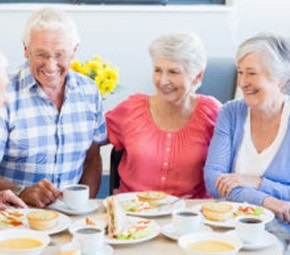Maintaining a healthy diet full of vegetables, fruits, proteins, and grains is one of the most important things that seniors can do to stay healthy. In addition to continuing to stay active, a healthy diet can help seniors stay as strong and independent as possible. Please read the healthy eating tips for seniors below to learn more.
Keep the following nutrition tips in mind when developing an eating regimen for your senior loved one:
- Choose nutrient-rich foods – An active attempt should be made to include more nutrient-rich foods into every senior’s diet. In addition to removing unhealthy items from the menu, more fat-free or low-fat dairy products, nuts, lean meats, whole grains, fruits, and vegetables should be included on an everyday basis. Seniors cannot afford to skimp on foods that have the critical minerals and vitamins required to improve their overall health.
- Be calorie conscious – The unhealthy ingredients in certain foods can cause seniors to gain unnecessary and unhealthy weight (unless they are instructed to do so by their doctor). For those not under this instruction, being careful with calories is a good idea for seniors. Try to avoid offering seniors empty calories or foods that are high in calories with no real nutritional value, such as alcohol, soda, cookies, and chips. This will help seniors avoid the onset of serious conditions, such as heart disease, diabetes, or becoming overweight.
- Remember the importance of hydration – Dehydration can be a serious problem for seniors, so do not overlook the importance of daily fluid intake. While water may be the best beverage choice, tea and coffee are acceptable when overall caffeine intake is monitored.
- Don’t forget calcium – Calcium promotes bone strength and helps improve overall health, but calcium deficiency is a common problem for seniors. If they are not getting enough calcium through their diets, seniors should consult their doctor about a supplement regiment.
- Be mindful of the senior’s appetite – It is not uncommon for seniors to become less hungry as they age due a range of causes. This means that every meal must be full of good calories and nutrient-rich foods to help keep muscles, organs, and bones strong and healthy. Seniors should see a doctor if they experience a noticeable weight loss caused by a reduced appetite.
At Angels Senior Living, we freshly prepare every meal with quality ingredients according to menus created by a registered dietician. This means that each meal is packed with healthy foods to ensure that seniors are getting the nutrients they need to stay as healthy as possible.
Would you like to learn more about Assisted Living for your senior loved one? Contact us today!






